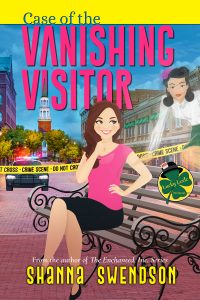My Books
Revisiting the Vanishing Visitor
by
 When I wrote Case of the Vanishing Visitor, it was inspired, in part, by the story about Agatha Christie’s disappearance during the 1920s. Her car was found wrecked in a remote place, her suitcase and driver’s license were in it, but she was nowhere to be found. There was a massive search for her, during which it came out that her husband was having an affair and leaving her for another woman. She was later found in a spa hotel about 200 miles away, registered under a different name (using the last name of her husband’s mistress). She claimed that she’d lost her memory, didn’t remember the accident or how she got to the hotel, and for much of the time she was there she didn’t even know who she was.
When I wrote Case of the Vanishing Visitor, it was inspired, in part, by the story about Agatha Christie’s disappearance during the 1920s. Her car was found wrecked in a remote place, her suitcase and driver’s license were in it, but she was nowhere to be found. There was a massive search for her, during which it came out that her husband was having an affair and leaving her for another woman. She was later found in a spa hotel about 200 miles away, registered under a different name (using the last name of her husband’s mistress). She claimed that she’d lost her memory, didn’t remember the accident or how she got to the hotel, and for much of the time she was there she didn’t even know who she was.
I was intrigued by this idea and thought it would be particularly fun to do with a sleuth who could see and talk to ghosts. At the time, my snarky theory was that Agatha had set it up to out her husband’s bad behavior and possibly even frame him for murdering her — or at least get public attention focused on his behavior so he’d look shady. Making your cheating soon-to-be ex look bad while having a spa vacation sounds like the perfect revenge.
But last night I watched this documentary about that incident, with new research into what might have happened. (You should be able to watch this video in the United States until around Christmas 2023, but you will likely have to be a PBS member after that. It may be available on the BBC site for those in the UK. And I’m sure there will eventually be a bootleg on YouTube.) Historian Lucy Worsley (my TV BFF — from following her on Facebook and watching her stuff, I bet we’d get along really well) talks to experts in psychiatry and digs into Christie’s books to get clues as to what might have happened. She’s also written a book on Christie, so this information may be included in the book.
Her conclusion is that I was wrong about it being a clever revenge scheme. A psychotherapist said it sounded to him like a fugue state. Christie did apparently see a specialist in London, and Worsley tracks down the specialist it might have been. There’s a description of a character in one of Christie’s books getting hypnotherapy, and the description of the doctor fits this one specialist. There was a lot of trauma in her life around that time, and the news about her husband might have caused her to snap. She did do an interview years later in which she discussed the incident, but it didn’t get nearly the attention the whole search and all the speculation around it did, so what she said about it isn’t as widely known as her disappearance and what people thought was happening at that time.
What I hadn’t been aware of is that Christie wrote non-mysteries under another name. They sound more like what we’d call “women’s fiction” now, dealing with issues in a woman’s life, with maybe a romantic subplot, and no murder. It’s these books that contain a lot of plot elements and characters that can be traced to this particular incident. She seemed to have used this pen name to deal with her issues. My library has some of these, shelved under Agatha Christie’s name, so I’ll have to read some. I’m curious about her writing without murder in it.
But I won’t worry about this info undermining my book because I just used it as inspiration and a jumping-off point, combined with some elements from the movie The Lady Vanishes and all the stuff I’d set up in my series.
I’m planning to take the next couple of weeks as semi-holidays (I may do some writing work, but I’m trying to spend less time on the computer), so I’ll resume blogging in the new year. In the meantime, have a happy holiday season.
